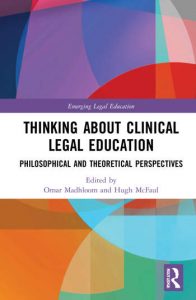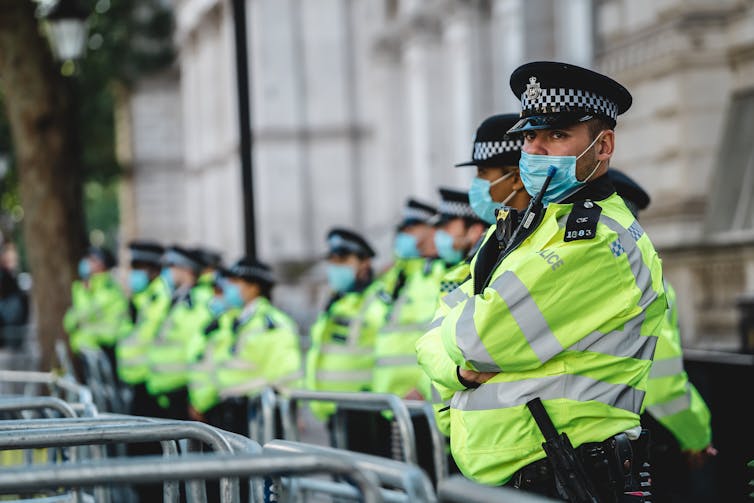by Peter Andersson, University of Gothenburg and Tonia Novitz, University of Bristol Law School

The crisis which arose in March 2020 regarding the coronavirus pandemic immediately centred on risk. Predictions had to be made swiftly regarding how the virus would spread, whom it might affect and what measures could be taken to prevent exposure, including in the workplace. As part of a broader Swedish Research Council project (2018 – 2022), we have conducted a comparative study of English and Swedish responses to the pandemic, focussing on their treatment of risk.
It was apparent that the two countries took very different approaches to COVID-19. For example, ‘lockdowns’ like those implemented in the UK were not imposed in Sweden, although Swedes were requested to work at home as much as possible.
We recognise that risk assessment plays two key roles. One is pre-emptive, namely to prevent harms rather than only compensating for such harms after the fact. The second role is defensive, protecting an employer from liability by demonstrating that due care was taken. We have found that the Swedish approach is more pre-emptive, while in the UK risk assessment is used more defensively in criminal and civil litigation.
The pre-emptive role of risk assessment, or the scope of any ability to prevent harms, is inherently limited by who is identified as the legitimate subject of risk assessment: ‘employees’, ‘workers’ or ‘independent contractors’? This has been the subject of a judicial review action brought by the Independent Workers’ Union of Great Britain (IWGB) against the Secretary of State for Law and Pensions. A significant outcome of the judgment delivered by Chamberlain J, which sought to implement the European Union (EU) Framework Directive on Health and Safety and the Personal Protection Equipment (PPE) Directive, was the extension of entitlement to PPE to so-called ‘limb(b) workers’ (as designated under UK statute) as opposed to merely ‘employees’. Moreover, the judgment recognised the right of ‘workers’ to refuse to work where there is serious or imminent danger under section 44 of the Employment Rights Act (ERA) 1996 without detriment. However, only those workers deemed ‘employees’ could claim protection from dismissal under section 100 of the ERA.
By way of contrast, Swedish work environment law has long recognised that a broader range of persons qualify for health and safety protections as ‘employees’ or ‘equivalent to employees’. A specific project was created extending protections to self-employed platform workers. After legal challenges in which employers successfully argued that they did not have ‘employer responsibility’, the Swedish Work Environment Authority abandoned this scheme, but a proposed EU Platform Work Directive (if adopted) may enable its reinstatement. In this sense, EU law has a significant effect on the coverage of risk assessment, which raises important issues regarding protection of those at work in the UK post-Brexit.
There is also a vital difference between England and Sweden in terms of the statutory funding and powers of relevant supervisory bodies. While both countries have comparable statutory agencies engaged in promoting assessment of risk by employers and its amelioration, the UK Health and Safety Executive (HSE) and the Swedish Work Environment Authority (SWEA), there were notable disparities between their capacities in the context of the pandemic. Both actively advocated that employers undertake additional risk assessment during the pandemic. However, funding of the HSE had declined dramatically in the years preceding the pandemic (from £331 million in 2009/10 to £226 million in 2019/20), such that a temporary injection of £14 million in May 2020 could not readily revive its supervisory functions, nor did the HSE intervene with detailed advice as regards what risk assessment in English workplaces should entail. Instead, it appeared that the HSE had ‘gone missing’. It was the English Government that issued sometimes questionable guidance on what was ‘COVID-secure’, with prominent advice from what was ‘Public Health England’ (since October 2021 replaced by two bodies, the UK Health Security Agency (UKHSA) and the Office for Health Improvement and Disparities, which places health-related issues more directly under UK Government control). Risks identified in such guidance tended to be solely physical and not psycho-social, despite forms of stress created by combined teleworking and home schooling, especially for women. It remains probable that in England, few civil and criminal cases will be brought, given that employers did follow the bare bones of this guidance. In this sense, risk assessment in England has served its defensive function for employers, but the rates of deaths and long-COVID now being reported suggest that the workforce did not go unharmed.
Finally, there is a significant difference between England and Sweden regarding the extent of collective worker representation promoted in OSH. In publications issued by the HSE during the pandemic, recommending that employers ‘talk to’ their workers, statutory requirements to inform and consult workers were glossed over. By way of contrast, the SWEA received more complaints and carried out more inspections, prompted by the active statutory role which trade union representatives play. There are wider ranging entitlements in Sweden to call for a stoppage of work until OSH issues are addressed and these were deployed in the context of the COVID-19 pandemic on 328 occasions.
In February 2022, most COVID-19-related public health restrictions ended in England and Sweden, despite criticism from scientists and medical professionals, giving further cause to reflect on different responses to management of risk assessment and their effects. While coronavirus variants spread globally and other issues concerning viral contagion remain, we consider there remain compelling arguments for legal, policy and institutional reform that deserve continued attention.
See further:










